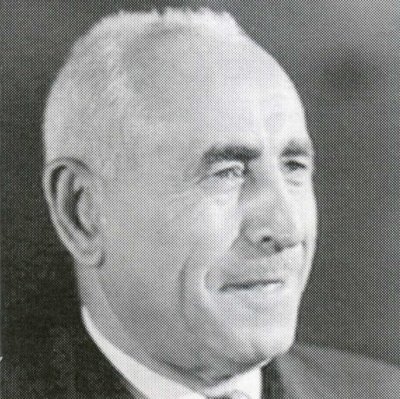
Abd al-Hamid Shuman
عبد الحميد شومان
Abd al-Hamid Shuman was born in Beit Hanina in the district of Jerusalem. His father was Ahmad and his brothers were Isa, Musa, and Yusuf. He and his first wife had a son, Abd al-Majid; she died when he was living abroad. With his second wife, Saniyya (the daughter of Ahmad Hilmi Abd al-Baqi), he had two children, Khalid and Najwa.
He attended the village primary school (kuttab) but discontinued his studies and began working at the local stone quarries.
In 1911, Shuman emigrated to the United States and worked as a travelling salesman before opening a small shop, which he developed into a factory carrying his name in New York City for ready-to-wear clothes.
In the United States, Shuman was active in many social, charitable, and journalistic fields. He bought a piece of land to serve as a cemetery for New York Muslims, extended facilities and support to Arab students, and assisted Arabic-language newspapers. He himself published an Arabic newspaper, Al-Dabbur, and was active in collecting and sending contributions to aid the national movements in Palestine and Syria.
In 1929, he returned to Palestine and founded the Arab Bank with a capital of 15,000 Palestinian pounds. The bank was officially registered on 21 May 1930. Regarding the name chosen for his bank, Shuman on one occasion said the following: “When I decided to establish the bank, I did not wish to give it my name or the name of my village, Beit Hanina, or my homeland Palestine … but instead the name of the Arab nation, the greater homeland. So I called it the Arab Bank.” Thanks to the support of his father-in-law, Ahmad Hilmi Abd al-Baqi, the bank grew very rapidly and branches were opened in most Palestinian cities.
Shuman was a member of the Central Committee to Aid Palestinian Victims, which the Supreme Moslem Council officially formed on 5 September 1929 following the al-Buraq Disturbances, and he became its treasurer.
Shuman was a close friend of most of the figures who established the Istiqlal Party in 1932. He could almost be regarded as one of that party’s pillars; however, he chose to distance himself from direct party activity in order to devote himself to running the bank.
On 22 April 1936, he joined Awni Abd al-Hadi, Muhammad Izzat Darwaza, and Ajjaj Nuwaihid in issuing a proclamation in the name of Jerusalem notables supporting the continuation of the Great Palestinian Rebellion against British policy.
Shuman was one of five delegates who represented the National Committee of Jerusalem in a conference of national committees held in Jerusalem on 7 May 1936. That conference announced refusal to pay taxes unless the British government changed its pro-Zionist policies. He was also elected member of the Supply and Boycott Committee formed to relieve those who suffered from the Great Palestinian Rebellion.
In July 1936, the British authorities arrested him along with other nationalists and interned him in the Sarafand camp near Ramla for a few months; he was arrested again in 1938 and held in the Mazra‘a camp near Acre.
In 1948, Shuman was able not only to preserve the deposits of thousands of citizens in his bank but also to open several branches of the bank in Arab and foreign countries. The bank is now the most important Palestinian financial institution in the world.
Abd al-Hamid Shuman, an intimate friend of many Arab national leaders and figures, was a self-made man, an unswerving patriot, a unionist, adherent proponent of independence, and an Arab nationalist. He was a generous man and a humanitarian. He and his father-in-law, Ahmad Hilmi Abd al-Baqi, led the Palestinian banking sector along, and his stewardship saved the Arab Bank from the catastrophic consequences of the 1948 Nakba.
He died in the Czech town of Karlovy Vary. His body was taken to Jerusalem, and he was buried next to al-Aqsa Mosque.
Shuman had stipulated that after his death a cultural foundation would be established to contribute to funding scientific, intellectual, medical, and technological research to benefit all Arab countries. The Abd al-Hamid Shuman Foundation was established in 1978 in Amman through the initiative of his son, Abd al-Majid Shuman. Among its most prominent sections is the Abd al-Hamid Shuman Cultural Association, the General Library and Data Systems, the Children’s Library, and the Arts Center.
Sources
الحوت، بيان نويهض. "القيادات والمؤسسات السياسية في فلسطين 1917- 1948". بيروت: مؤسسة الدراسات الفلسطينية، 1981.
دروزة، محمد عزة. "مذكرات محمد عزة دروزة: سجل حافل بمسيرة الحركة العربية والقضية الفلسطينية خلال قرن من الزمن" (خمسة مجلدات). بيروت: دار الغرب الإسلامي، 1993.
"ذكرى عبد الحميد شومان، 1890- 1974". عمّان: لجنة تأبين عبد الحميد شومان، 1974.
Related Content
Popular action
Great Palestinian Rebellion, 1936-1939
A Popular Uprising Facing a Ruthless Repression